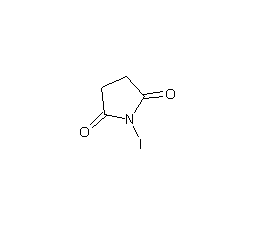
Structural formula
| Business number | 05BN |
|---|---|
| Molecular formula | C4H4INO2 |
| Molecular weight | 224.98 |
| label |
iodination agent |
Numbering system
CAS number:516-12-1
MDL number:MFCD00005512
EINECS number:208-221-6
RTECS number:WN2817000
BRN number:113917
PubChem number:24853162
Physical property data
1. Character: White needle-like crystal
2. Density (g/ cm3, 25/4℃): Undetermined
3 . Relative vapor density (g/cm3, air=1): Undetermined
4. Melting point (ºC): 200-201
5. Boiling point (ºC, normal pressure): Undetermined
6. Boiling point (ºC, 8kPa): Undetermined
7. Refractive index: Undetermined
8 . Flash point (ºC): Not determined
9. Specific rotation (º): Not determined
10. Autoignition point or ignition temperature (ºC): Not determined
p>
11. Vapor pressure (kPa, 25ºC): Undetermined
12. Saturated vapor pressure (kPa, 60ºC): Undetermined
13. Heat of combustion (KJ /mol): Undetermined
14. Critical temperature (ºC): Undetermined
15. Critical pressure (KPa): Undetermined
16. Oil and water Log value of the (octanol/water) partition coefficient: Undetermined
17. Explosion upper limit (%, V/V): Undetermined
18. Explosion lower limit (%, V /V): Undetermined
19. Solubility: Soluble in methanol, acetone, moderately soluble in dioxane, insoluble in ether and carbon tetrachloride.
Toxicological data
1. Acute toxicity: mouse intravenous TD50: 180gm/kg, no detailed description except lethal dose;
Ecological data
This substance may be harmful to the environment, and special attention should be paid to water bodies.
Molecular structure data
1. Molar refractive index: 35.55
2. Molar volume (cm3/mol): 97.0
3. Isotonic specific volume (90.2K ): 272.9
4. Surface tension (dyne/cm): 62.4
5. Polarizability (10-24cm3): 14.09
Compute chemical data
1. Reference value for hydrophobic parameter calculation (XlogP): -0.2
2. Number of hydrogen bond donors: 0
3. Number of hydrogen bond acceptors: 2
4. Number of rotatable chemical bonds: 0
5. Number of tautomers: 3
6. Topological molecule polar surface area 37.4
7. Number of heavy atoms: 8
8. Surface charge: 0
9. Complexity: 129
10. Number of isotope atoms: 0
11. Determine the number of atomic stereocenters: 0
12. Uncertain number of atomic stereocenters: 0
13. Determine the number of chemical bond stereocenters: 0
14. Number of uncertain chemical bond stereocenters: 0
15. Number of covalent bond units: 1
Properties and stability
Use and store according to specifications, no decomposition will occur, and avoid contact with oxides
Storage method
Stored at 2-8°C in a cool, dry, well-ventilated warehouse. Keep away from fire and heat sources. Protect from direct sunlight. The packaging is sealed. They should be stored separately from acids and food chemicals, and avoid mixed storage. Suitable materials should be available in the storage area to contain spills.
Synthesis method
1. Under light-proof conditions, react succinimide with silver oxide to prepare N-succinimide silver. It reacts with iodine in dry dioxane to form N-iodosuccinimide.
2. Put 20 grams (0.079 mol) of iodine in a brown bottle with a wide mouth and a screw cap with a capacity of 150 to 200 ml. and 90 ml of dry dioxane, most of the iodine is dissolved. Add 18 grams (0.087 mol) of thoroughly dried silver N-butylene phthalimide. The bottle was shaken vigorously for a few minutes and the mixture was shaken occasionally over the next hour and then heated in a 50°C water bath for 5 minutes. Strain it through a Buchner funnel while it is hot and well-wrapped in black paper or aluminum foil. ml filter bottle. The silver iodide was collected and washed with 10 ml of hot dioxane. Combine the filtrate in the filter bottle, add 200 ml of carbon tetrachloride, and let the solution cool at -8°C to -20°C overnight. N-iodosuccinimide will precipitate as colorless crystals. Collect in a Buchner funnel with minimal exposure to light, wash with 25 ml of carbon tetrachloride, filter with suction and dry. Dry overnight at 25°C/1m rn in the dark. N-iodobutylene phthalimide weighs 14.3-15.1 grams (81-85%),
Purpose
1. Used in the iodination of ketones and aldehydes in organic synthesis.
2. Mainly used as pharmaceutical intermediates in biopharmaceuticals
3.Mild and effective iodination agent. Split glycols, thioacetal or ketone iodide enol acetate, generate α-iodoketone, iodide pyridoxine, etc.

 微信扫一扫打赏
微信扫一扫打赏

